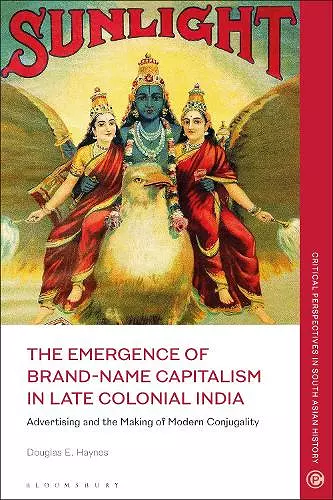The Emergence of Brand-Name Capitalism in Late Colonial India
Advertising and the Making of Modern Conjugality
Format:Hardback
Publisher:Bloomsbury Publishing PLC
Published:20th Oct '22
Currently unavailable, and unfortunately no date known when it will be back

This book explores the development of professional advertising in western India between 1920 and 1945, focusing on the ways global businesses sought to cultivate consumption of their commodities among a rising urban middle class.
This book examines the emergence of professional advertising in western India during the interwar period. It explores the ways in which global manufacturers advanced a ‘brand-name capitalism’ among the Indian middle class by promoting the sale of global commodities during the 1920s and 1930s, a time when advertising was first introduced in India as a profession and underwent critical transformations.
Analysing the cultural strategies, both verbal and visual, used by foreign businesses in their advertisements to capture urban consumers, Haynes argues that the promoters of various commodities crystalized their campaigns around principles of modern conjugality. He also highlights the limitations of brand-name capitalism during this period, examining both its inability to cultivate markets in the countryside or among the urban poor, and its failure to secure middle-class customers. With numerous examples of illustrated advertisements taken from Indian newspapers, the book discusses campaigns for male sex tonics and women’s medicines, hot drinks such as Ovaltine and Horlicks, soaps such as Lifebuoy, Lux and Sunlight, cooking mediums such as Dalda and electrical household technologies. By examining the formation of ‘brand-name capitalism’ and two key structures that accompanied it- the advertising agency and the field of professional advertising- this book sheds new light on the global consumer economy in interwar India, and places developments in South Asia into a larger global history of consumer capitalism.
A landmark contribution in the history of global capitalism, Haynes crafts an aesthetic visual archive of the modern professional advertising world in colonial western India. The book’s phenomenal textual analysis of advertisements in various languages and cities is indispensable for scholarship on urban middle classes, modern conjugality, gender relations, consumption practices, masculinities, medicine and sexual sciences.
* Charu Gupta, Professor of History, University of Delhi, India *By showing how advertisements for consumer products drew upon and reinforced ideas about family and conjugality, Haynes connects the history of business with the making of a middle class in India. This is a path-breaking book, not least for the novel material analysed with insight and elegance.
* Tirthankar Roy, Professor of Economic History, London School of Economics, UK *In this rich cultural history, Haynes traces how advertisers in India interwove global commodity trends and localized concerns, responding to and shaping new ideas of gender and family. Where other scholars have analyzed individual ads to explore ideas of health, modernity or class, Haynes draws out in compelling detail where and why ads took the form they did, connecting culture and commerce, capital and politics.
* Abigail McGowan, Professor of History, University of Vermont, USA *With its choice of visual material, discussion of middle class conjugalities, and a journey into the intimate worlds of brand-name commodities, this book paves a new path for the future of business histories in general. * Business History Review *
This brilliant book adds fresh perspectives on South Asian history by foregrounding visual culture, modernity, conjugality, and consumerism. The book is an important contribution to business history, and the history of capitalism in a colonial context. The book will not only appeal to scholars and students, but also non-academic readers interested in histories of consumption culture, marketing and advertising, health, sexuality and the modern family. * H-Soz-Kult *
Brand-Name Capitalism is a major contribution to Indian social and economic history. Richly illustrated with many examples of advertisements culled from newspapers and the archives of advertising companies, the book also contributes to the literature on the history of India’s visual culture. Through painstaking archival research, Haynes has collated and insightfully analysed a wealth of material, providing new insights into the social history of the urban middle class as well as the history of capitalism in India. * Indian Economic and Social History Review *
The Emergence of Brand-Name Capitalism in Late Colonial India is a fascinating history at the intersections of histories of capitalism, advertising, modernity, and colonialism in India. * Cultural and Social Histo
ISBN: 9781350278042
Dimensions: 236mm x 158mm x 24mm
Weight: 640g
328 pages